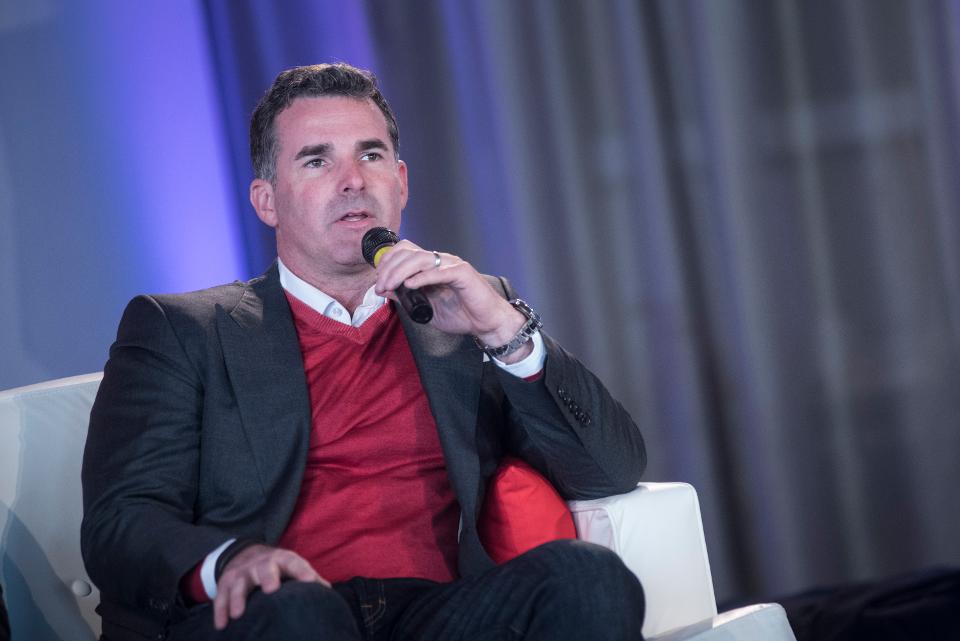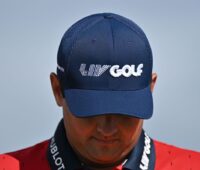
In Conversation with Kevin Plank
Kevin Plank, a billionaire and philanthropist, is the founder and former CEO of Under Armour, one of the largest sportswear companies in the world. Plank is a former football player who spent his childhood in Kensington, Maryland, a suburb of Washington, D.C., where his mother served as mayor and his father was a land developer. In this wide ranging interview, Plank talks about the risks he took and the lessons he learned en route to building Under Armour into a megabrand.
Host 1: It’s now time to speak to another CEO. We’ve been in conversation with Mr. Kevin Plank. He is the Under Armour founder, chairman, CEO, and a man who has got an amazing story. We’re going to let him tell it, but to launch a company and have to basically be a door to door salesman for the first few years; he launched the company out of his grandmother’s basement, which I think is kind of a nice anecdote now. And of course, as we all know, Under Armor have become the third sports apparel brand after Adidas and Nike. It’s quite crazy. They launched in 1996.
Host 2: It’s remarkable. What was he doing, selling out of the trunk?
Host 1: Yeah, pretty much. He was going up and down the country. He was knocking on the doors of various sports teams and trying to get this product in the hands of as many people as he could. But let’s get his story about the birth of Under Armor. And when we caught up with Kevin Plank, we asked how big his dream had been when he first set out?
Kevin Plank: The dream was never a big dream. It was a dream that lives day by day. So I know, and I hope that there’s an entrepreneur out there that’s thinking about, I’ve got this idea, I may want to try to start this company or curate this app or whatever you’re contemplating. But what I can tell you is an entrepreneur who sits here on a bit of the other side of the barrel is that there’s no one day, there’s no one thing that sort of clicks.
You just have to get up and you have to decide for yourself that tomorrow is going to be a little better than today and next week will be a little better than this week. For me, the journey was one of…I was an athlete, I was an American football player. I played at university, the University of Maryland, was my Alma mater and I wasn’t a particularly great athlete. And so, I was always looking for an edge or an advantage and I’m always aware of the things that I wish could have been better and I never understood as all the innovation would come out and things like footwear, no one ever addressed apparel. And as an athlete, underneath your uniform, your jersey, your pads, you would just wear the same old basic short sleeve cotton tee shirt in the summer and long sleeve cotton tee shirt in the winter.
And it used to just befuddle me, it just blew my mind why no one had ever taken on innovating against this. And a cotton tee shirt dry was about six ounces and saturated, it would weigh up to three pounds. And I just said there has to be a better alternative. And so the concept was as simple as: what if we took something like a synthetic material like I’ve seen in biker shorts before and what if somebody made that for the upper body? And I just simply went to a local fabric store, bought some material and took a tight little white Hanes t-shirt to a local tailor. I had to make up six or seven samples and made the first seven prototypes of Under Armour and realized this was a concept that would work because I tested it out on my teammates from the University of Maryland and they told me that they liked it.
Host 1: It was kind of a half-invention really, because he took an already existing material and he just applied it to a different part of the body.
Host 2: Yeah, you heard it there. He took just a plain white tee-shirt, applied it to that, went in, showed it to his buddies and his buddies said, yeah, it’s working. It’s making a difference to just sporting t-shirts.
Host 3: And so before this, people were still using cotton tee-shirts for athletic purposes. That’s what surprises me because you never see that anymore. You have those sort of special fabrics for this.
Host 2: Dry wick, they call them.
Host 1: It’s as he was saying. He said it goes from a few ounces to three pounds when it’s saturated. Obviously that makes a huge difference when they talk about marginal gains in the world of sport. But do you ever have those kinds of ideas? Are you the kind of person that thinks, how could I improve that? Because I think it’s quite a rare trait to be able to notice something like that and spot an opportunity.
Host 2: No. You see, I would go one step further than that. I think an awful lot of people, even our listeners as well, I think a lot of people out there have the idea, it’s the probably second guess themselves and say, Oh, that’s silly. It’s having the wherewithal to take the next step. I mean, in fairness to Kevin and we’ll hear his story over the course of the next 20 minutes or so, but to have an idea to then have the time, the gumption to go out and actually buy a plain white tee shirt to stick that on, to throw it to meet and then take each step, that’s where we’re talking 0.0001% of people out there that are willing…
Host 1: And then even when you do that, you need a bit of luck. You need to make the right decisions. You need things to go your way for it to take off.
Host 2: Absolutely.
Host 1: Paul has been in touch to say, it’s not the idea, it’s getting bankrolled to do it. That’s the hard part. Usually, I would be the first to agree. And I think in most cases that is spot on. But the actual truth of Kevin Plank’s experience was that he was not bankrolled. He took some big risks and they paid off as you’ll hear here.
Kevin Plank: We were coming off of $1 million a year in 1999, on our way to being a $5 million company of the next year. But we didn’t have any money, I was dead broke. And you know, when entrepreneurs ask, they talk about venture capital and raising money, so the best thing you can do is sell the inventory that you have. You know, it doesn’t come with a board seat or someone telling you what to do or how to run your business. And so, the bet was we’d gotten to a guy named Oliver Stone who was making a movie called ‘Any Given Sunday’ starring Al Pachino and Cameron Diaz and this whole host of great actors. And they were going to use Under Armor as almost a character in the movie. And it was taking a bet from one time where I looked around the company and I had to ask some of the, we call them teammates if they wouldn’t mind skipping their paycheck for a couple of weeks and if they would, they get some more equity in the company.
And in making that bet because this commercial is going to come out or the movie is going to come out at the end of 1999, I thought they’d see these logos on these athletes in the movie and these actors in the movie like Jamie Fox, and I thought they’d think it was a fictitious company. And so that time it was about print. And we took a half-page Ad in ESPN, the magazine, it costs $25,000; it was all the money that we had. That time, there were 15 of us or 12 of us sitting around a table and asked everybody their opinion. And some said they thought it was a good idea and some said they thought it wasn’t such a good idea.
Well, the good news is that I got to make the call and we just decided to spend the $25,000 on the Ad. And that $25,000 Ad on a year where we did $1.3 million a year before in all of 12 months that Ad generated close to $800,000 in sales over the next 10 days to two weeks. So when I was, would have been somebody going out and saying, I gotta go find venture capital instead, what do I do is just sell the inventory that we had. So it saved the company and allowed us to take the next step.
Host 1: Kevin Plank’s company has now grown from a handful of trusted friends to over 15,000 employees globally. What qualities does he look for in a person?
Kevin Plank: Well, you’ve got the foundational things like character and integrity, all those matter. But hunger is so important. You know, it’s interesting—I’ve lived a lot of different chapters of the brand at this point, 23 years into it. People have said we’ve actually been receiving criticism, people say, you’ve started this company with just a bunch of your friends and people that you knew. And I said, look, I was a state school graduate from the University of Maryland. I was a former football player with no money to start a company. I didn’t have Harvard MBAs lining up at the door to say, can I get a job? And so much of the process and the journey has been having people that just love the brand and finding people that can love and believe in the mission.
And when you’re trying to compel somebody at 22 or 23 to work for you they better believe that you have the right idea and that they can get behind you. And so as you start building up, it’s not a loyalty, but it’s a trust and it’s a belief and you have to earn that. And I like to say that trust is something that is built and drops in, it’s lost in buckets. And so every day we deposit toward that trust bucket and making people see that what they’re building towards is something that is, it’s worth getting beyond. It’s worth working for. It’s worth the long nights and beyond the early ones that were there that were part of the pre IPO equity. It’s the ones that are there now that are saying this company is really just getting started and that the best days is not me talking about grandma’s house, it’s talking about the transformation we’ve been on and the opportunity we have in front of us right now is that to build and be the biggest, baddest brand on the planet. And that’s what we want to become.
I was once in a store and I watched this mom walk into a sporting goods store about four o’clock in the afternoon and she had two little boys with her. One maybe 10, the other one maybe eight years old. And they sort of, she had them in both hands and all of a sudden one little boy stops and says, “Mom, mom, look, it’s Under Armour, Under Armour, Under Armor in the store.
And you see the mom kinda grabs him and says, “Don’t go over there, that stuff’s expensive. I didn’t bring you here to buy Under Armor.”
And I’m watching this happen and I’m looking at boy, I’m like, go, go break away. Little boy breaks away. Mom’s helping the other one and he runs over and he grabs this Under Armor shirt. And it was just after school so he’s got a collar. He grabs his compression shirt off of the rack. He sticks his head through it, he punches his arms out, and he just says, he puts his shirt on and I’m watching this whole thing happen. He steps out into the middle of the aisle and he puts his arms up like Superman. He’s making two muscles and he just goes, “Hey mom.” And his collar is all jacked up underneath of him with his Under Armour compression showing. He goes, “Hey mom.” He goes, “Look at me. I’m wearing Under Armour. I can do anything.”
And like that moment to me was one where he’s like, mom, I need this shirt in order to be my best self. It gave him a superpower and that’s what we want to do. At any time, any girl, any boy puts our product on, engages with our brand that they feel like they just got a little bit better. And whether that is someone trying to make a team, whether someone trying to win a championship, whether it’s just someone who’s walking into the cafeteria with their tray in their hand and they’re trying to get the confidence to say, where am I going to go? Standards set.
But today they’ve got something different. Today they’re wearing Under Armour and they can actually be a little bit better.
Host 2: I think we all want to know, please tell me, did you buy the little boy that t-shirt, Kevin? Did the mum buy it, what happened? We’re all on tenterhooks here.
Kevin Plank: We took care of them for sure. It wasn’t a number for life. It was a number for the week.
You can find a hundred reasons why you probably shouldn’t start the company, but you only really need one to say, I’m going to go get after this and I believe in it. And whether you want to make the full bet like I did is I was bartending at nights before I started and then I got to a point where even the three hours of bartending or four hours, it took me to bartend to make a few hundred dollars that would sort of get me on to the next night or get me through.
I quit because I said I need to put every hour and ounce that I had into just starting my company. If you’re going to go for it you’ve got to believe, you’ve got to be all in. When you’re ready to make that decision, make sure that you’re ready to make it absolute and you know, go for it. One thing that’s important is don’t save anything for the swim back. If you want to get into a business and be an entrepreneur, don’t hedge. You know, put yourself in a position where, for me, I did it when I was 22 or 23 years old, so I didn’t have any money. I didn’t have very far to fall. And I thought if I blew it, it costs myself $50,000 or $100,000. And I figured I’m pretty capable. Maybe I could go sell cars or something. I could make the money back.
But make sure doing it when you’re 35 or 40, and you’ve got kids or things, there are other things that you think about, but for the young entrepreneurs that are out there, there’s no better time for you to take that chance and go for it. Because what I can tell you is that there was nothing that says, well, he did his thing. There was no book, there was no Oracle that I spoke to. There was no one person. And if you’re listening to this program and you think that I’m going to say one thing that’s gonna inspire you, I’m not. If you think that there’s someone that you’re going to ask and say, if I could just get their advice, there’s not. There’s never anything that’s clear. You just have to make the very best decision every single day. But the key is, just keep making lots of small decisions. Just keep moving forward.
Click here to listen this episode of “Off Script with Chris & Robbie: In conversation with Under Armour CEO Kevin Plank” >>










Leave a Reply
Be the First to Comment!
You must be logged in to post a comment.
You must be logged in to post a comment.